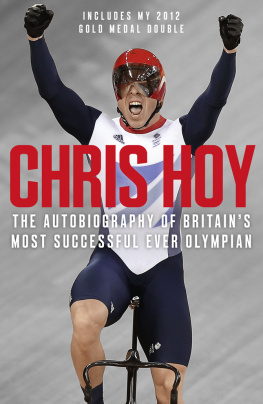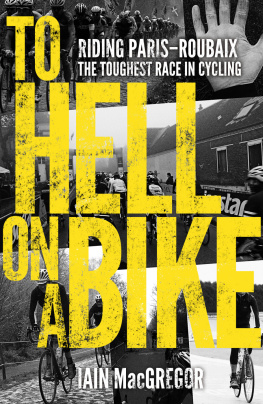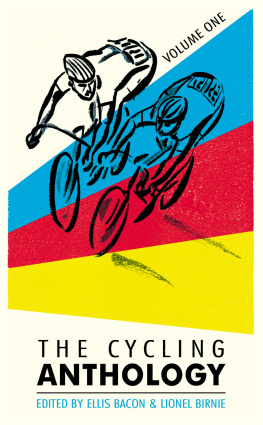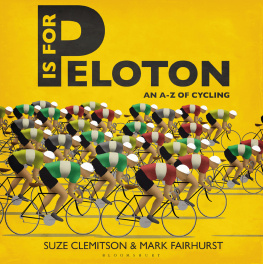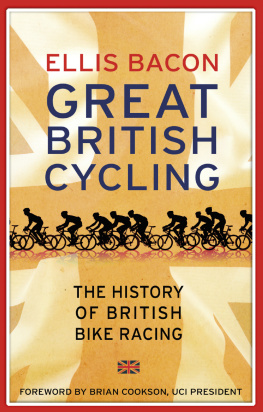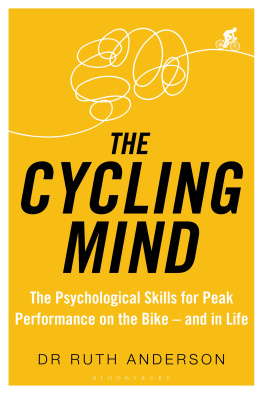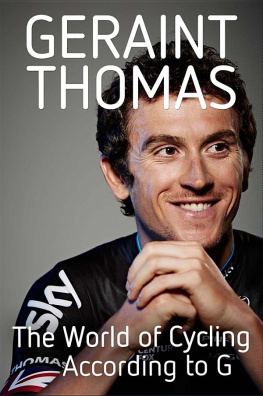THE MEDAL FACTORY
THE MEDAL FACTORY
BRITISH CYCLING AND THE COST OF GOLD
KENNY PRYDE

First published in Great Britain in 2020 by
PURSUIT BOOKS
an imprint of Profile Books Ltd
29 Cloth Fair
London EC1A 7JQ
www.profilebooks.com
Copyright Kenny Pryde, 2020
The moral right of the author has been asserted.
Cover design: Estuary English
Cover images Getty Images
All rights reserved. Without limiting the rights under copyright reserved above, no part of this publication may be reproduced, stored or introduced into a retrieval system, or transmitted, in any form or by any means (electronic, mechanical, photocopying, recording or otherwise), without the prior written permission of both the copyright owner and the publisher of this book.
A CIP catalogue record for this book is available from the British Library.
ISBN 9781781259856
eISBN 9781782834168
Special thanks to the women whove indulged me for decades, Sandra and Katie
INTRODUCTION
Viewed from the comfortable distance of 2019, it takes effort to recall that there was a period during which British Cycling and Team Sky were both widely acclaimed as unqualified successes. Certainly, inside cycling there were critics of both organisations, but fans, the wider public, sports federations and even captains of industry were all loudly impressed by what they had witnessed from 2004 to 2012.
Within British Cycling and Team Sky, among its riders, coaches and managers, British cycling was widely perceived as cutting edge on every front, in training and talent identification, from nutrition and sports psychology to technology. When you tallied up the international successes of these outfits on track and road, how could you fail to be impressed?
From being a derided sporting irrelevance (men with shaved legs in skintight Bermuda shorts playing on kids toys!) to knighthoods and cereal box endorsements, cycling moved to centre stage in British sporting culture, thanks to unstoppable success garnered via a collection of articulate and funny riders who became household names. In a ten-year period British men and women were victorious in almost everything that was worth winning on road and track, from yellow and rainbow jerseys to medals at World, Commonwealth and European level; British cycling and its riders dazzled.
At the 2000 Sydney Olympics, we started to see riders in Team GB skinsuits winning medals; powerhouse Jason Quealey in the kilo surprising everyone; 20-year-old Bradley Wiggins part of a medal-winning team pursuit quartet; the joyous confirmation of the track results in Athens four years later; Nicole Cookes celebratory roar in a soaking Beijing road race in 2008; and, of course, the multiple glories of 2012 in France and London. And yet, in spite of all this, by 2016 British cycling ended up staring into the abyss, racked by self-doubt, excoriated in the media and criticised in Parliament. The metamorphosis of British cycling from centre of sporting excellence to den of iniquity is even more dramatic when you take a step back to take in the unprecedented turnaround that the management regime had set in motion in the previous two decades.
Was ever a sport so fulsomely praised before being brought to its knees as rapidly as British cycling? Gleefully celebrated in the national media as a medal factory then pilloried as a den of cheating sexist bullies in the space of a few weeks, British cycling and riders were subjected to a forensic public interrogation. Having worked its way to the top of world cycling after almost twenty years of struggle, British cyclings coaches, riders and reputation were all but destroyed in a six-month horrow show of grotesque headlines and allegations. How did it happen, to come so far and fall so fast?
This book tells the story of the people who transformed the sport of cycling in Britain, detailing how they built a winning culture, uncovering the histories that shaped the most successful British Olympic sports team in history. In doing so, those characters turned an underfunded niche sport into a mainstream pastime. Cycling travelled so far from its origins, scaled the highest heights at Olympic Games, World championships and Tours de France, yet ended up plumbing grim depths. The story of British Cyclings Medal Factory and its denizens is a remarkable one.
When accusations of sexism and bullying erupted in spring 2016, questions were asked in the Houses of Parliament, yet this wasnt the first time that British Cycling had been held up to scrutiny. Back in 1995, members of Parliament demanded changes after the chaos inside cyclings governing body came to light. Those parliamentary interventions led to revolutionary changes, and it is there that this story begins, with the arrival of the characters who would build the Lottery-funded Medal Factory.
This book reveals the happy coincidences, the happenstance, the hard work and alliances that helped revitalise and reshape the culture inside British Cycling, forging a squad, coaches and management that enjoyed staggering success over three full Olympic cycles.
The background of the key characters Peter Keen, Dave Brailsford, Shane Sutton as well as the myriad supporting players is uncovered, detailing how Olympic and World Championship successes were achieved and at what cost. The departure of the first performance director and Medal Factory architect Keen, the rise of Brailsford, the arrival of Team Sky, the frictions and rivalries that emerged are all exposed, as British Cycling and its riders continue their extraordinary rise.
This is an examination of British Cycling and British cyclists the tale of the people who helped fundamentally transform the sport and how they were brought down to earth. Its a tale of breathtaking vision, unswerving drive and inescapable hubris. From Peter Keen to Dave Brailsford, from Bradley Wiggins to Chris Froome via Shane Sutton and many others, this is the story of the people who built British Cyclings Medal Factory and Team Sky.
1
THE ANNUS HORRIBILIS
Where did it all go wrong? Well, where do you start?
If the birth of the golden age of British cycling can be pinpointed to 29 July 1992 in Barcelona to Lotus and Chris Boardman, a pursuit medal, gold then the event that triggered its destruction also has a date. It was 2 March 2016. With the nation watching in expectation of another round of championship cycling medals and Union Jacks, British Cyclings world was instead about to crumble in front of their eyes.
That fateful day during the World track championships was when Great Britain womens sprinter Jess Varnish was interviewed by BBC televisions Jill Douglas. Having finished fifth in the womens team sprint and thus failed to qualify for the upcoming Rio Olympics, Varnish explained that her preparation for those London World Championships had been little short of a disaster. In the context of such conventionally bland TV encounters, it was a veritable bombshell.
Offering a sympathetic question to the disappointed non-qualifier, Douglas, in an arm-around-the-shoulder tone, suggested, It must be bittersweet to have come so close?
Completely bitter, countered Varnish, who was flanked by her sprint partner, Katy Marchant. Weve been playing catch-up for two years after decisions that had been made above us. Marchant added, People above us have made the complications for us and put us where we are now.
Marchant had flashed across the line just eight hundredths of a second off fourth place and Olympic qualification. But, as a consequence of this and previous results, Team Great Britain would
Next page

